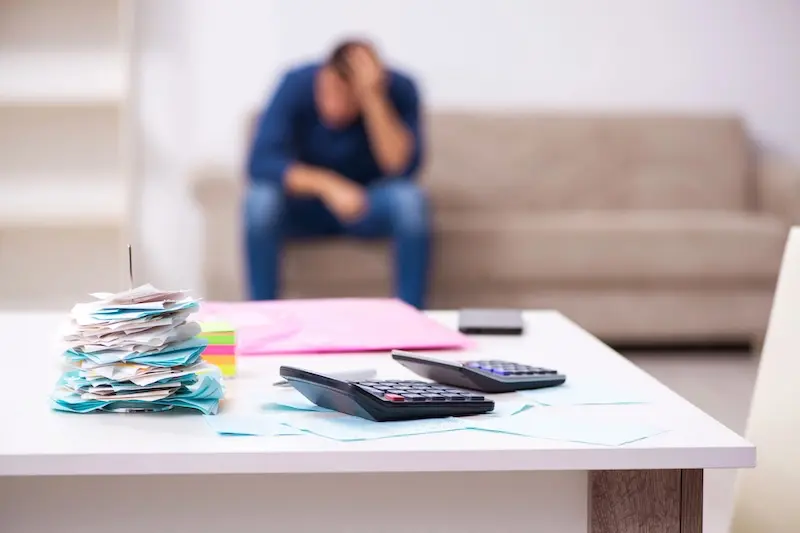For many people in Ireland, there comes a point when juggling bills, loans, and household costs becomes overwhelming, so if you’ve reached the stage where you think “I can’t pay my debts”, you’re certainly not alone.
When you are weighed down with the burden of mounting bills and can’t seem to make ends meet, it can be difficult to know what to do next. While falling into arrears is stressful, we are here to reassure you that there is a way forward. Everyone is entitled to be treated with dignity, regardless of their financial situation. Under Irish Law, there are clear protections in place that must be respected, and there are several structured solutions to help you regain some financial stability.
This guide explains what happens when you fall behind, answers common concerns, and explores when personal insolvency may be the right step forward.
I can’t pay my debts, specifically my rent or mortgage
For most people, rent or mortgage payments are the largest monthly expense. When debts begin to build, meeting those housing costs can quickly feel overwhelming.
If you cannot pay your rent or mortgage:
- Tenants: A landlord may begin eviction proceedings if arrears build up, but they cannot simply remove you from the property without notice. You must be allowed to resolve matters first. Support services such as Threshold Ireland can help you manage disputes with landlords, while MABS (Money Advice & Budgeting Service) offers confidential guidance on negotiating payment solutions.
- Mortgage holders: Banks must follow the Mortgage Arrears Resolution Process (MARP), a set of rules from the Central Bank. This requires lenders to assess your situation fairly, explore restructuring options, and treat repossession only as a last resort.
The most important step is to act early. Speaking with your landlord or lender as soon as difficulties arise gives you the best chance of finding a manageable solution. Professional advice can provide reassurance and help you protect your home.
Will I lose my home because I can’t pay my debts?
Missing payments does not automatically mean you will lose your home. In Ireland, repossession is treated as a last resort, and lenders must prove to the court that they have followed every required step before seeking it.
Key protections include:
- Repossession is always considered the last resort.
- Lenders must demonstrate they attempted to work with you first.
- Under a Personal Insolvency Arrangement (PIA), you may be able to restructure debts while keeping your family home.
While repossession can happen, it is relatively rare compared to the number of households in arrears. At the end of March 2025, there were just over 40,000 private residential mortgage accounts in arrears, but out of these, just 23 properties were repossessed by lenders. This shows that, in most cases, there are legal solutions and structured arrangements designed to keep people housed.
If you are worried about losing your home, seek advice quickly; there are many paths to explore before repossession becomes a real risk.

Can I go to prison for debt in Ireland?
Another common fear is that unpaid consumer debt could land someone in prison.
The truth is:
- You cannot be imprisoned simply for owing money, such as credit cards, personal loans, or mortgages.
- Imprisonment may only occur if you disobey a court order, for example, if you have the means but deliberately refuse to pay under an instalment order.
- Fines for criminal offences are separate and dealt with differently by the courts.
The focus of debt enforcement is repayment, not punishment. The majority of people find themselves in financial difficulty for reasons that are out of their control, such as a physical or mental illness, inability to find suitable employment, rising living costs or a change in family circumstances.
I can’t pay my debts, and I don’t know how to stop debt collectors
Dealing with debt collectors can feel stressful, but the law places strict limits on how and when they can contact you.
By law:
- They cannot call you more than three times per month unless you request it.
- Calls are only permitted between 9am and 9pm, Monday to Saturday.
- They cannot contact your employer or family about your debt.
- Harassment, intimidation, or false threats are illegal under the Non-Fatal Offences Against the Person Act 1997.
If you feel overwhelmed by letters or calls, you do not have to face them alone. A Personal Insolvency Practitioner (PIP) can step in to manage all communications on your behalf. This ensures creditors deal with you fairly, within the law, and removes the day-to-day stress of constant contact.
Can I write off my debt in Ireland?
Yes, the legislation in Ireland allows for formal ways to reduce or even write off debt, depending on your situation. Can’t pay your debts and want to write them off?
Here are your options:
- Debt Relief Notice (DRN) – for those with unsecured debts under €35,000, little income, and minimal assets.
- Debt Settlement Arrangement (DSA) – for larger unsecured debts such as credit cards and personal loans.
- Personal Insolvency Arrangement (PIA) – for people with a mix of secured (e.g., mortgages) and unsecured debts.
- Bankruptcy – the last resort, used when no other option works and debts exceed €20,000.
Each option has a different set of conditions, but all are designed to help people wipe the slate clean and make a fresh start. We mentioned a Personal Insolvency Arrangement as one option, so keep reading to find out the next steps.
How to declare insolvency in Ireland
Declaring insolvency is not something that happens automatically, and there are some conditions that will need to be met.
To start the process:
- 1. Seek advice from MABS or a PIP – they can assess whether you qualify and which solution is best.
- 2. Complete a Prescribed Financial Statement (PFS) – this gives your chosen PIP a full picture of your finances.
- 3. Apply for a protective certificate – this prevents creditors from taking action while a solution is arranged.
- 4. Agree on a proposal – your PIP negotiates with creditors and sets out a repayment or write-off plan.
At each stage, you remain entitled to a reasonable standard of living, including food, healthcare, education, and modest savings. But at the same time, it’s certainly not going to cover luxury goods or five-star holidays.

What is a Personal Insolvency Arrangement?
For people with a combination of a mortgage and other debts, a PIA stands out as the most common option for resolution.
A Personal Insolvency Arrangement:
- Covers secured and unsecured debts.
- Typically lasts five to six years.
- Allows you to stay in your home in most cases.
- Can write off a portion of unsecured debt while restructuring secured loans.
- Protects you from further demands or legal action once agreed.
At the end of the arrangement, if you have kept to the terms and conditions, your unsecured debts are written off. This leaves you to move forward to the next stage of your life, free from the shackles of debt.
What happens if I can’t pay my loan?
While mortgages and rent are often the biggest financial burdens, there are other forms of debt, such as personal loans, credit cards or overdrafts.
In recent years, there has been an upsurge in the use of “Buy Now, Pay Later” purchases. Taking Klarna as one such example, a recent report found that 41% of Klarna customers do not pay their debt back on time. It’s easy to be tempted by these convenient types of credit, but they do fall into the category of debt.
If you stop paying a personal loan, credit card, overdraft or indeed any other form of credit:
- The creditor may apply to the court for a judgment order.
- Once granted, they can register the judgment, which affects your credit record and may appear in publications such as Stubbs Gazette.
- They can then enforce the debt through methods such as instalment orders, attachment of earnings, or judgment mortgages.
However, if you engage with creditors and seek advice early, court action can usually be avoided.
Can I stop a repossession?
Yes. Repossession is not inevitable, and it is treated as a last resort in Ireland. Nobody wants to see someone left without a home.
If you’re fearing a possible repossession, here are your options:
- Alternative repayment arrangements with your lender.
- Personal Insolvency Arrangements, which may restructure your mortgage and allow you to keep your home.
- Court review, where a PIA proposal is rejected by creditors but the court imposes it in the interests of fairness.
The key is to act quickly. Once a repossession order is granted, it becomes a lot more difficult to navigate a way around it.

When to consider personal insolvency
In the fog of financial hardship, it can be difficult to see a clear path ahead. So how do you know if the route of personal insolvency is the right one for you?
Here are some points to consider:
- You can’t pay your debts despite cutting back on all non-essential spending.
- Creditors are threatening legal action, repossession, or judgment enforcement.
- Interest and arrears are increasing faster than you can repay.
- Debt stress is affecting your health, relationships, or ability to work.
- You need a structured plan and legal protection to regain control.
If these signs sound familiar, speaking with a PIP can give you clarity and a roadmap forward.
I can’t pay my debts – How can Alan McGee & Co help me?
At Alan McGee & Co., clients in financial difficulty are never treated as just another case. With direct access to an experienced solicitor and licensed PIP, you’ll receive practical advice, clear explanations, and support every step of the way.
- Over 600 Personal Insolvency Arrangements completed.
- Tailored consultations – Every situation is different. We listen carefully, assess your needs, and outline clear next steps.
- Fast, compassionate, and jargon-free guidance for people across Ireland.
If you’re worried that you can’t pay your debts, and you’re worried about losing your home, have a confidential chat with us and take the first step towards a fresh start.

